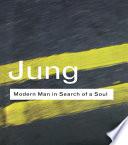Quotes from book
Modern Man in Search of a Soul

Modern Man in Search of a Soul is a book of psychological essays written by Swiss psychologist Carl Jung.

“No psychic value can disappear without being replaced by another of equivalent intensity.”
Source: Modern Man in Search of a Soul (1933), p. 209

“The least of things with a meaning is worth more in life than the greatest of things without it.”
Source: Modern Man in Search of a Soul (1933), p. 67
Context: For it all depends on how we look at things, and not on how they are in themselves. The least of things with a meaning is worth more in life than the greatest of things without it.

“Whatever we look at, and however we look at it, we see only through our own eyes.”
Source: Modern Man in Search of a Soul

p. 49 http://books.google.com/books?id=U6lMnx8AQsYC&q=%22The+meeting+of+two+personalities+is+like+the+contact+of+two+chemical+substances+if+there+is+any+reaction+both+are%22+%22transformed%22&pg=PA49#v=onepage
Modern Man in Search of a Soul (1933)
Variant: The meeting of two personalities is like the contact of two chemical substances: if there is any reaction, both are transformed.
Source: Psychological Reflections: A New Anthology of His Writings 1905-61

Source: Modern Man in Search of a Soul (1933), p. 69
Context: The great decisions of human life have as a rule far more to do with the instincts and other mysterious unconscious factors than with conscious will and well-meaning reasonableness. The shoe that fits one person pinches another; there is no recipe for living that suits all cases. Each of us carries his own life-form—an indeterminable form which cannot be superseded by any other.

p 11; this was originally listed here in a somewhat misleading form combining it with another statement on the interpretations of dreams on p. 14: No language exists that cannot be misused … Every Interpretation is hypothetical, for it is a mere attempt to read an unfamiliar text.
Modern Man in Search of a Soul (1933)
Context: It is imperative that we should not pare down the meaning of a dream to fit some narrow doctrine. … No language exists that cannot be misused. It is hard to realize how badly we are fooled by the abuse of ideas, it even seems as if the unconscious had a way of strangling the physician in the coils of his own theory.

Source: Modern Man in Search of a Soul (1933), p. 14
Context: Every interpretation is hypothetical, for it is a mere attempt to read an unfamiliar text. An obscure dream, taken by itself, can rarely be interpreted with any certainty, so that I attach little importance to the interpretation of single dreams. With a series of dreams we can have more confidence in our interpretations, for the later dreams correct the mistakes we have made m handling those that went before. We are also better able, in a dream series, to recognize the important contents and basic themes.

Source: Modern Man in Search of a Soul (1933), p. 126
Context: Every civilized human being, whatever his conscious development, is still an archaic man at the deeper levels of his psyche. Just as the human body connects us with the mammals and displays numerous relics of earlier evolutionary stages going back to even the reptilian age, so the human psyche is likewise a product of evolution which, when followed up to its origins, show countless archaic traits.

Chap. 11 (Psychotherapists or the Clergy), p. 229 http://books.google.com/books?id=mAsPAQAAIAAJ&q=%22Among+all+my+patients+in+the+second+half+of+life+that+is+to+say+over+thirty+five+there+has+not+been+one+whose+problem+in+the+last+resort+was+not+that+of+finding+a+religious+outlook+on+life%22&pg=PA229#v=onepage
Modern Man in Search of a Soul (1933)

“We cannot change anything unless we accept it. Condemnation does not liberate; it oppresses.”
Variant: We cannot change anything unless we accept it.
Source: Modern Man in Search of a Soul